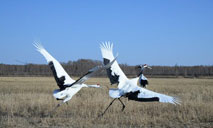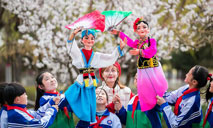China calls on U.S. for healthy competition and cooperation
China calls on the U.S. for healthy competition and win-win cooperation between the two countries, Vice Foreign Minister Le Yucheng said in an interview with the Associated Press on Friday, adding that the two countries should do their utmost to avoid confrontation, especially factitious confrontation. Below is a summary of the interview with the AP.
How does China define bilateral ties?
"It disproportionately stresses competition and confrontation, and plays down cooperation. Such an approach is too negative and lacks a forward-going spirit," said Le commenting on the U.S.' definition of the relationship.
The U.S. has said China is a "most serious competitor,"and defined the relationship as competitive, cooperative and adversarial.
"In English, you have the prefix of 'co-', which means doing things together. In cooperation, one should not be selfish and care only about self interests with little regard for the well-being of the other side," Le said.
Talking about U.S. Special Envoy John Kerry's trip to China for discussions on cooperation against climate change, Le pointed out that cooperation in more areas can be conducted.
"For instance, we have provided favorable COVID-19 vaccination arrangements for each other's diplomats," he said.
How to keep human rights differences from derailing cooperation?
"Differences must not be turned into friction points, and human rights are no excuse to interfere in each other's internal affairs. And no country is in the position to lecture others on human rights issues," Le stressed.
The vice foreign minister noted that practices can be different, though human rights have some universality, and mentioned the COVID-19 response as an example. "If for some, tens of thousands of lives are the cost to pay for the right to not wear masks, if that is what they call personal freedom and human rights, then we have no comments to make."
"How our two countries can keep our human rights differences from derailing cooperation in other areas. My answer is to respect each other, no interference, and having dialogue as equals," he said.
As for the Xinjiang-related issues which always has been a flash point, Le reiterated China's stance, saying that those companies which have been sanctioned are registered and operate lawfully. "Xinjiang is open to the outside. You are all welcome to go and see."
Le also touched on the Hong Kong issues, saying that the improvement of the Hong Kong SAR's electoral system has won support from residents in Hong Kong.
"According to opinion polls, 70 percent of them support the improvement, and over 2.3 million Hong Kong residents have signed letters to express support," he said.
As for the Taiwan-related questions, Le said the national reunification of China is a historical process and the tide of history.
"We will never let Taiwan go independent. We are prepared to do everything we can for peaceful reunification. That said, we don't pledge to give up other options. No option is excluded," he stressed.
Talking about the South China Sea, he said that the United States is not a party directly concerned.
How do you see China's foreign policy going forward?
China will open wider, and continue to expand, broaden and deepen opening-up at a higher level, Le said, referring to China's goal for high-quality development and building a new development paradigm with domestic circulation as the mainstay and, domestic and international circulations reinforcing each other.
"This would bring more development opportunities, a growing market and broader prospects for cooperation," he said.
And for China's diplomacy, Le stressed building a community with a shared future for mankind. "We advocate a new type of international relations featuring mutual respect, fairness, justice and win-win cooperation."
For the bilateral ties in future, Le said China-U.S. relations should be put back on track.
"COVID-19 response and economic recovery are the two areas where China-U.S. cooperation could be critically important," he said, adding that the United States should not mistake teammates as adversaries.
Photos
Related Stories
- Full Text: China-U.S. Joint Statement Addressing the Climate Crisis
- China, U.S. issue joint statement on climate change
- U.S.-listed Chinese firms trade mostly higher
- China, U.S. ready for cooperation on climate change
- China warns Japan, U.S. against undermining China's interests
- Chinese, U.S. climate envoys to hold talks in Shanghai
- US urged not to escalate use of Taiwan card
- Biden would do world a favor by dumping Trump’s trade practices
- China 'more humanistic' than US when building ports in Africa: ex-Greek minister
- China's NDRC, U.S. multinational enterprises hold roundtable meeting on Outline of 14th Five-Year Plan
Copyright © 2021 People's Daily Online. All Rights Reserved.










